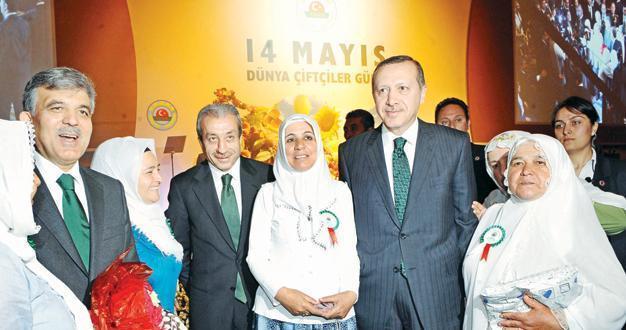Turkish government, main opposition clash over agriculture policies
ANKARA - Hürriyet Daily News

President Abdullah Gül (4th left), PM Recep Tayyip Erdoğan (3rd right) and Minister Mehdi Eker (C) participate in a ceremony in Ankara to mark the Farmer’s Day. DAILY NEWS photo, Selahattin SÖNMEZ
Prime Minister Recep Tayyip Erdoğan outlined bright prospects for
Turkey’s agricultural sector on International Farmers’ Day yesterday, but the main opposition leader argued that some key sectors were in decline and accused the government of withholding promised incentives.
The government sees
agriculture as a “strategic” sector, Erdoğan said, adding that a combination of structural reforms, land consolidation and incentives have boosted Turkey’s gross domestic product in agriculture from $23.4 billion to $62.7 billion since 2002. Per capita income in the sector rose from $1,000 to $3,653 in the same period, while agricultural exports grew from $3 billion to $15.3 billion, he said. The amount of financial support for farmers increased by 274 percent, reaching about 7 billion Turkish Liras in 2011, he added.
Need for water canals
Under the Justice and Development Party (AKP), 11,000 more square kilometers were made irrigated land, bringing the total to 55,000 square kilometers, Erdoğan said. He said efforts were needed to replace all open irrigation canals, in which up to 65 percent of water is lost because of vaporization.
Speaking at the same gathering, Republican People’s Party (CHP) leader Kemal Kılıçdaroğlu contested Erdoğan’s optimism and said a large portion of Turkey’s farmers were grappling with serious financial problems.
Under amendments to the Agriculture Law passed in 2007, the government is obliged to spend at least 1 percent of Turkey’s gross domestic product to prop up the farming sector, but it has never done so, Kılıçdaroğlu said. In the past decade, the land cultivated for wheat decreased by 13 million decares, as the price of one liter of diesel fuel increased from the equivalent of 3.5 to eight kilograms of wheat, he said.
As a further comparison, Kılıçdaroğlu said the total taxes farmers paid on fuel amounted to 9 billion liras annually, while the incentives they received from the government stood at about 6-7 billion liras. “They put 6 billion in the farmer’s pocket and take 9 billion from the other pocket. And they call this support for farming,” he said.
President Abdullah Gül, who also took the floor at the gathering, called for a speedy completion of irrigation canals in the southeast, saying the increase in output in irrigated areas was “incredible.” The husbandry sector needs to be further developed and modernized as “the fastest way for a family to earn income,” he added.
The Turkish agriculture sector produces some 14 percent of national income, 15 percent of exports and employs some 40 percent of the workforce, according to Nejat Gamzeli, a board member of the Turkish Union of Agriculture Chambers. The sector serves as “insurance” for some 1.5 million hidden unemployed people in the country, he said.
Meanwhile Rifat Hisarcıklıoğlu, the head of the Union of Chambers and Commodity Exchanges, said yesterday that agriculture and husbandry have become more significant in recent years. These businesses are conducted to earn money rather than to eat one’s fill as they used to be in the past, he said.
